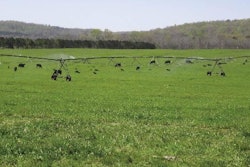Last year when Congress mandated a fivefold increase in the use of biofuels, you might have wondered what our elected representatives were thinking. The arithmetic behind the policy never made sense – there's not enough corn to feed growing demand for food and fuel and some of the results are now painfully clear. Fuel prices are higher than ever, and prices for food in the U.S. have risen by what translates to an annual 5.3 percent in just the first three months of this year. In poorer countries, higher food prices are leading to riots and political instability, as people can't afford to buy enough food. The question now is, will our elected representatives act to correct a misguided policy?
Soaring grain prices aren't the sole cause of rising food prices around the world, but they are a significant component. Food prices are also being driven by the growing demand for food imports in places like India and China, drought in Australia that hurt grain harvests and rising energy costs. Professor C. Ford Runge at the University of Minnesota calculates that one-third of the spike in food prices is due to the use of corn for fuel rather than food. The rest, he believes, is due to weather and demand. But the use of corn for biofuels has been singled out because it is one factor over which governments have control. Some world political leaders are now pointing a finger of blame at U.S. biofuels policy. At a recent conference in Washington, for example, finance ministers and central bankers of seven leading industrial countries demanded a reconsideration of biofuel policies.
So, what are our elected representatives thinking? Senator Charles Grassley, Republican of Iowa, recently called criticism of the USA's ethanol policy by foreign officials "a big joke." Referring to those critics, he was quoted as saying, "You make ethanol out of corn. I bet if I set a bushel of corn in front of those delegates, not one of them would eat it." What else can a senator from Iowa say? On the other hand, Representative Jim McGovern, Democrat of Massachusetts, said, "If there was a secret vote, there is a pretty large number of people who would like to reassess what we are doing." But there will be no secret votes, and the reality is that political support for ethanol subsidies and mandates remains strong.
We can only hope that over time U.S. policy can be guided in a more rational direction. The U.S. Congress made a big mistake in mandating the ethanol-from-corn approach to address the energy problem. Instead of promoting experimentation and competition to find the best solutions, Congress decided to force the wrong technology on the nation. Perhaps it was just this sort of thing John Stuart Mill had in mind when he wrote, "Instead of the function of governing, for which it is radically unfit, the proper office of a representative assembly is to watch and control government."
Meanwhile there is international turmoil. In some countries, food inflation has prompted protectionism of a different sort. Recently at least a dozen countries have reduced tariffs to food imports and created barriers to exports in efforts to restrain increases in food prices. India, for example, is restricting grain exports. The International Monetary Fund pointed to an escalation of uncertainty worldwide and even the threat of war as millions of people find themselves unable to afford food.
As the U.S. poultry industry heads into uncharted waters of soaring grain prices, it has important strengths to weather the economic turmoil. Poultry production's feed conversion is superior to that of its red-meat competitors. As the higher cost of feed works its way into higher prices for all meat proteins, chicken starts out more affordable and that advantage gets leverage as costs rise. But the unstable political and economic climate that exists worldwide carries risk for all.




.jpg?auto=format%2Ccompress&fit=crop&h=167&q=70&w=250)












